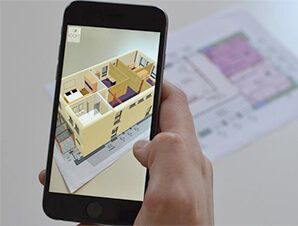With the rise of technology and its integration into various industries, augmented reality (AR) has become a game-changer in the real estate market. AR is a technology that overlays virtual elements onto the real-world environment, enhancing our perception and offering immersive experiences. In real estate marketing, AR has proven to be an effective tool for engaging potential buyers, showcasing properties, and streamlining the home buying process.
Advantages of AR in Real Estate Marketing
1. Enhanced Visualization:
AR allows buyers to visualize properties in an immersive and interactive way. Through the use of AR apps, potential buyers can virtually walk through properties, explore different rooms, and even place virtual furniture to see how it fits in the space. This technology provides a realistic representation of the property, enabling buyers to make more informed decisions without physically visiting the location.
2. Increased Engagement:
AR enhances customer engagement, making the property viewing experience more interactive and enjoyable. Buyers can access additional information about the property, such as its history, amenities, and nearby facilities, by simply scanning the property with their mobile device. This level of engagement keeps potential buyers hooked, leading to increased interest and a higher chance of converting them into customers.
3. Time and Cost Efficiency:
Traditional property viewings can be time-consuming and costly for both buyers and real estate agents. AR eliminates the need for physical visits to multiple properties, saving time and money in the process. Buyers can virtually explore various properties at their convenience, reducing unnecessary travel and narrowing down their options more efficiently. Likewise, agents can focus on serious prospects, resulting in a more streamlined and efficient sales process.
Implementing AR in Real Estate Marketing
1. AR Property Listings:
Add AR features to your property listings to provide an enhanced virtual tour for potential buyers. This can be done through dedicated AR applications or by integrating AR capabilities into existing real estate platforms. By allowing buyers to virtually explore the property, you provide an immersive experience that sets your listings apart from the competition.
2. Virtual Staging:
AR can be used to stage properties virtually, saving time and resources required for physical staging. By adding virtual furniture and décor to an empty property, buyers can better visualize how the space could be utilized. This feature is especially valuable for new constructions or vacant properties.
3. Augmented Reality Marketing Campaigns:
Utilize AR in marketing campaigns to create buzz and attract potential buyers. AR-driven advertisements can be placed on billboards, magazines, or even sent through email, providing an interactive experience for the target audience. Encourage users to scan QR codes or download your AR app to access exclusive content and virtual property tours.
Challenges and Future Potential
While AR offers numerous advantages in real estate marketing, it also presents certain challenges. One of the main obstacles is the technological barrier. Users need compatible devices and software to experience AR effectively, which can limit its reach in certain markets. Additionally, creating high-quality AR experiences requires investment in skilled developers and content creation.
However, as technology continues to advance, these challenges are expected to diminish. The future potential of AR in real estate marketing is vast. We can envision a world where buyers can have personalized virtual tours tailored to their preferences, where property information is seamlessly displayed in real-time through smart glasses, and where real estate agents can conduct virtual meetings with clients through augmented reality interfaces.
Conclusion
Augmented reality has revolutionized the way real estate marketing is conducted. Its ability to enhance visualization, increase engagement, and streamline the buying process offers tremendous benefits to both buyers and real estate agents. By embracing AR technology and exploring its possibilities, the real estate industry can elevate the customer experience and drive sales in new and exciting ways.
Author: Your Name
Published Date: [Current Date]
